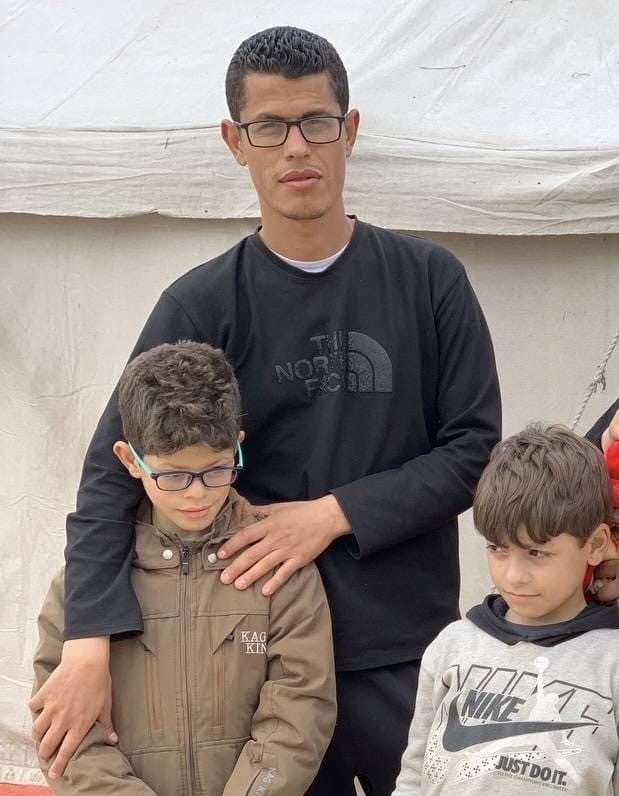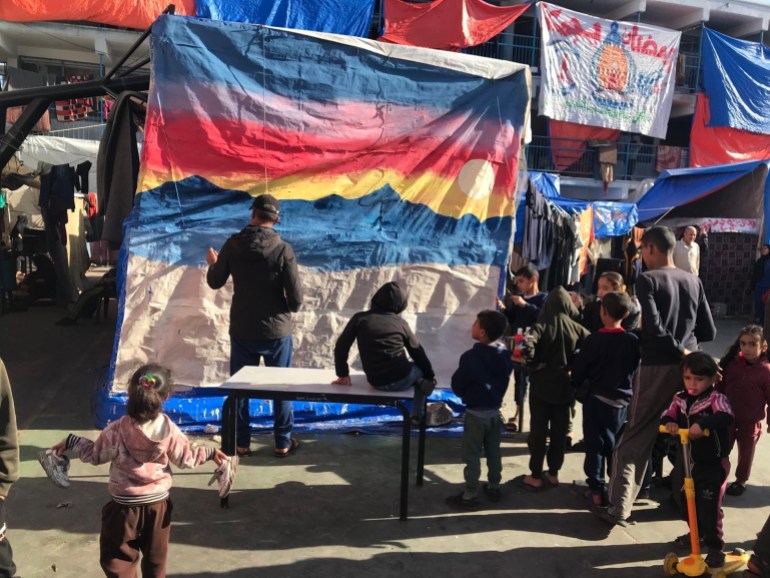Sarah Aljamal dreamed of being a voice actor for the animated films Tangled or Ratatouille.
She had started taking singing lessons from Fouad Shams, one of the most famous voice actors in the Middle East.
Like many young women, her dream was to be independent.
Although the 23-year-old from Gaza City was born with a hole in her heart and underwent more than 20 surgeries for congenital defects in bones and joints in her short life, she was determined.
In addition to learning to be a voice actor, Aljamal also did translations and helped an international charity with disability issues.
But all that disappeared when her family’s home was bombed on the first day of Israel’s war on Gaza.
After months of being forced out of Gaza City to a single room on the ground floor of a building in Rafah, she and her family of eight – like many others in the eastern part of the city – received an ominous call from the Israeli army on Monday morning: Go to al- Mawasi, the army said.
Aljamal, who can barely walk a few meters, is desperate.
Fearing an impending offensive in Rafah, she had tried to raise money to finance her family’s escape. But since then, Israel has occupied and closed the Rafah border crossing into Egypt – cutting off the only exit from the Strip and blocking the main lifeline of aid flows to Gaza.
Now Aljamal fears what lies ahead for her and her family as they plan their trip to al-Mawasi. They have to walk while she is transported in a wheelchair.
“How am I supposed to live in a tent with my parents under these health conditions? Will I be able to survive or will I die… because I can’t move?” She wondered.
From a home by the sea into an uncertain future
For Khader al-Belbesy, 32, the evacuation order and the Israeli military’s gradual advance into Rafah feel like the final nail in a coffin.
For the father of three, leaving the southern city with his young family is like taking them to an active battlefield.
On Monday, he received an airdropped leaflet from the Israeli army ordering him and his family to leave eastern Rafah. He said dropping the leaflets felt like the military had thrown saws directly at them.
“My mind is confused and I’m looking for a place. There is no transport,” al-Belbesy told Al Jazeera.
Life in Gaza before the war was not easy due to the ongoing Israeli blockade, but al-Belbesy had tried to build a comfortable life for his family – he worked hard as an electrician and his wife Tasneem, 31, was a talented pharmacist.
They lived in a large house near the sea in Tal al-Hawa and their eldest son Walid, 9, played in a football club in the hope of one day becoming a professional footballer.
This club no longer exists as many of its young players were killed in the war. And the family lost their job, their house, their car and all their possessions.
“I never thought something like this would happen to me and my family,” al-Belbesy said. “The war destroyed everything.”
A little over a month ago, Tasneem gave birth to their third child – without medical care – in the one-room apartment where they had sought refuge for months.
There was no transportation to get to the nearest hospital, which al-Belbesy said may have been pointless anyway since the war had put all of Gaza’s hospitals out of service.
He had also raised funds to evacuate his family to Egypt to escape, and now he would leave Gaza even if a permanent ceasefire came tomorrow, he said.
“I [will] Looking for a country where I can go with my children to ensure a future for them… Because the Gaza Strip [requires] 20 years for rehabilitation,” al-Belbesy said.

‘Necessity is the mother of invention’
Mohammed Almadhoun has been trying to flee Gaza for months – but the allegedly inflated prices charged by border officials have put him off the journey.
The 44-year-old visual artist from Jabalia in the Gaza Strip was supposed to fly to Ireland for an art residency. His flight was scheduled for October 7, the same day Hamas launched its surprise attack on Israel.
He now runs mural painting workshops for the children at the school where he is staying, using whatever leftover materials and paint he can find.

He now lives in the corner of a classroom, crammed like sardines with other Palestinians.
Living conditions there had led to health problems, including pneumonia that he contracted from the cold several months ago, he said.
“The windows are open and cannot be closed because of the bombing. They break and it becomes dangerous for us,” he told Al Jazeera.
The noise of Israeli airstrikes has been almost constant over the past seven months, and when Israel launched an overnight attack on East Rafah earlier this week, “the noise of the bombings didn’t stop all night,” he said.
“Our life is a hell without mercy for humanity. I’m writing to you while I’m crying,” he said via cell phone message.
But even in his torment, the artist found ways to be creative.
In addition to teaching art classes to children, he has set up a makeshift oven using a large can of burning pulp soaked in canned fish oil.
“Necessity is the mother of invention,” he said.
One vehicle, several families, mattresses piled high
Louise Wateridge has witnessed for weeks the insecurity felt by Aljamal, al-Belbesy and Almadhoun and the thousands of Palestinians there.
“People here really can’t even plan for a week, let alone a few days,” the United Nations Agency for Palestine Refugees (UNWRA) spokesperson told Al Jazeera.
“It’s just the way life has been for the last few months,” said Wateridge, from western Rafah.
Now this uncertainty has worsened.
“That horrible image of what we saw during the war, of these displaced families with all their belongings in a vehicle, mattresses stacked on top of each other, everything… We see a lot of that.”
But this exodus towards western Rafah is happening slowly, she said, as many are unable to leave for financial or physical reasons.
Those who remain are choosing to use what little money they have left on food, water and other essentials, she added.
Aljamal’s family is one of many who have run out of money but are still trying to make the trek west.
Her father had saved for her treatment in Egypt before the war. But since then they have used all the money and a little more to rent the small room they had been staying in in the east of Rafah.
The family is still looking for a tent in al-Mawasi to stay overnight.
“I dreamed of living a beautiful life… but the war destroyed our dreams, our homes and our lives,” Aljamal said.
“Will I one day prove myself and achieve all my ambitions?”
